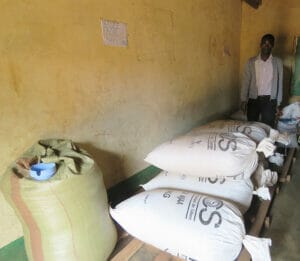News > Blog
Growing Healthy Food, Connections through School Gardens
Published 08/21/2019 by Global Communities

When Peter Masaju started a school garden at Suguti A Primary School in Musoma District, Tanzania, he planted the seeds for more than just healthy, homegrown vegetables. He also created an opportunity for parents to feel more rooted in their children’s day-to-day school experiences.
“For the past seven years, I have not witnessed such a positive relationship between parents and the school until recently with these school gardening activities,” said Yasinta Alex, head teacher at Suguti A Primary School. “There were times in which parents, school administrations and village governments were lacking the cooperation essential to execute a project.”
This new sense of collaboration is the result of an ongoing school meals and education program funded by the U.S. Department of Agriculture and implemented by Project Concern International (PCI). The McGovern-Dole International Food for Education and Child Nutrition program currently benefits more than 168,000 pre-primary and primary students from 231 schools in the Mara Region. Each school received training and support to start a school garden.
Masaju, a teacher at Suguti A Primary School, was appointed to run the garden and recruited 40 students to be part of a club that helps with its care and maintenance. Aside from planting vegetable seeds provided by PCI, which included amaranth, eggplant, Chinese cabbage, African eggplant and Ethiopian mustard, Masaju also sourced fruit trees such as banana, papaya, avocado and passionfruit. The club grows cabbage and onions as well.

Photo by Victor Mapile/PCI
School garden teacher Peter Masaju displays a portion of the community’s contributions to school meals at Suguti A Primary School in Musoma District.
According to Masaju, the garden produced a harvest of 922 kilograms (or 2,032 pounds) of fruits and vegetables between July 2017 and November 2018. Of that total, 73% was eaten at the school by students and schoolteachers. The remaining 27% of produce was used to build trust among parents.
In the community where Suguti A Primary School is located, families rely on fishing as their main livelihood. Men must travel long distances for days or weeks at a time to work and money is tight. According to Joashi Sondo, the school committee chairperson and a resident of Suguti Village, an average family earns 3,000 Tanzanian shillings (about $1.30 U.S. dollars) per day.
When it came to securing community contributions for the school feeding program, Masaju and Alex said families were hesitant to donate in the past. They learned that parents thought teachers were consuming the produce instead of students. To counter this notion, Masaju and his fellow staff members came up with a plan to share extra harvest items from the school garden. Anything not used for the school feeding program is sent home with students on a class rotation system. Some of the vegetables are also sold to buy more seeds and salts to supplement school meals.
Teachers said this approach has sparked parents’ curiosity about the school feeding program and inspired them to work more closely with Sugati A Primary School in support of their children’s education. Within the first quarter of year 3 of the program, the community contributed 700 kg (or 1,543 pounds) of maize to the school.
“We thought the best way to propel the school forward is to engage parents. Bringing them closer to it was an important step,” Masaju said. “Sharing the harvest was among the ways of making them understand what we do and to start getting them involved. We’re glad it has turned out positively.”
Story written by Amithay Kuhanda. Photos by Victor Mapile.




